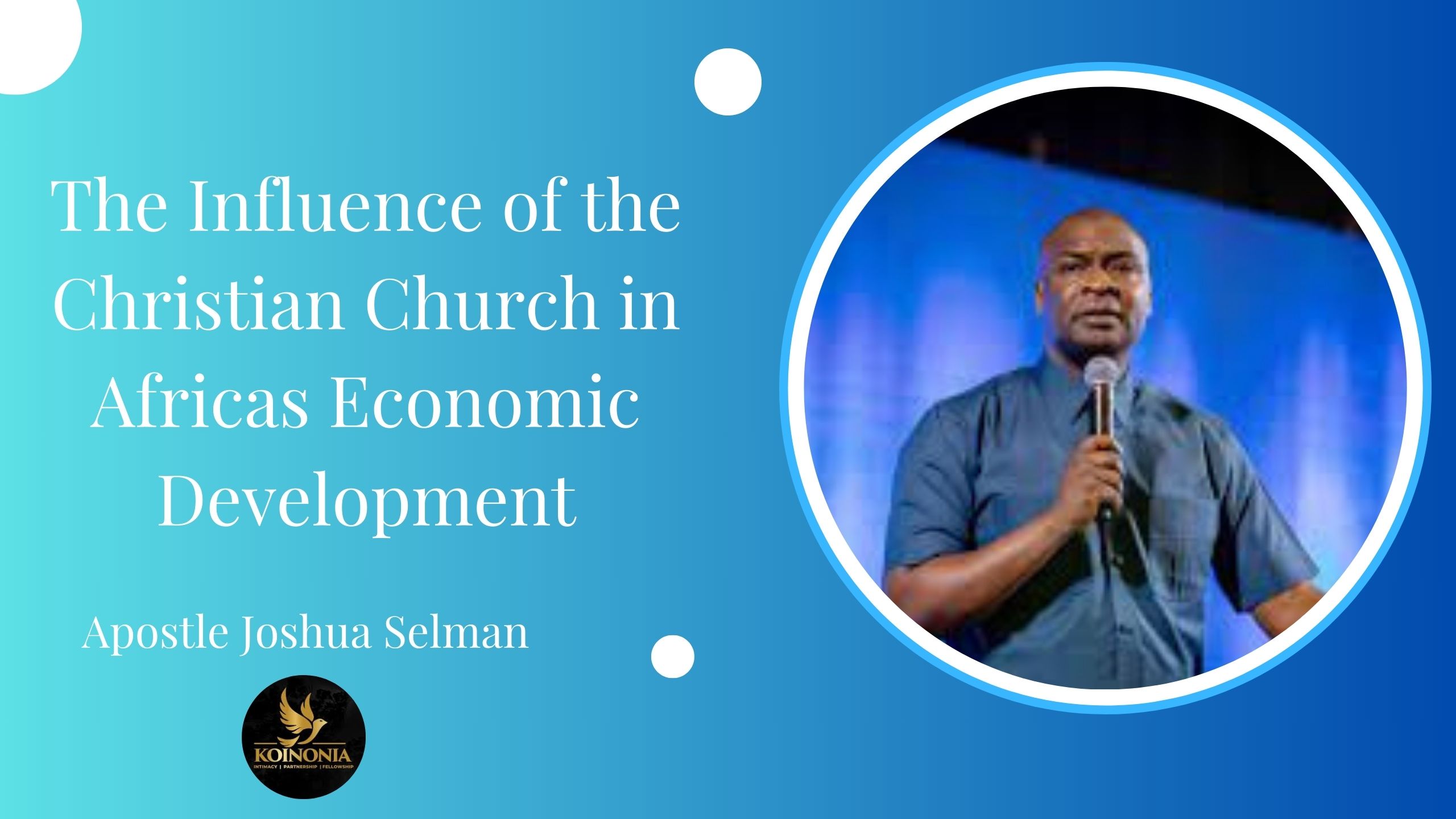The Influence of the Christian Church in Africa’s Economic Development By Apostle Joshua Selman
The Christian Church has played a multifaceted role in Africa’s economic development, shaping societies through education, healthcare, community building, and the promotion of social and ethical standards. Over the years, the Church’s influence has extended beyond spiritual guidance, contributing to Africa’s growth and addressing socio-economic challenges.
1. Historical Context
The Christian Church in Africa traces its roots to the early days of Christianity, notably through the arrival of missionaries in the 19th century during the colonial era. Missionaries established schools, hospitals, and agricultural projects, laying the foundation for economic development.
While the colonial context complicated the Church’s role, it also opened opportunities for the development of infrastructure and education systems that have continued to benefit African societies.
2. Education and Human Capital Development
One of the most significant contributions of the Christian Church has been in education:
- Establishment of Schools and Universities: Missionary-founded institutions like Makerere University in Uganda and Fourah Bay College in Sierra Leone continue to contribute to Africa’s educated workforce.
- Literacy Campaigns: Early missionaries taught reading and writing to facilitate Bible study, but this inadvertently improved literacy rates, which boosted employability and innovation.
- Values-Based Education: Many Christian schools emphasize ethics, integrity, and community service, shaping responsible leaders for Africa’s future.
3. Healthcare Contributions
Healthcare is another area where the Christian Church has significantly influenced economic development:
- Mission Hospitals: Institutions like the AIC Kijabe Hospital in Kenya and St. Mary’s Mission Hospital in Zimbabwe provide affordable healthcare services, increasing workforce productivity.
- HIV/AIDS Response: Churches have been at the forefront of awareness campaigns, offering care and counseling services that reduce the disease’s economic burden.
- Training Medical Personnel: Many Church-run institutions offer medical education, producing skilled healthcare professionals critical for economic stability.
4. Community Building and Social Stability
The Church fosters social cohesion and provides a platform for conflict resolution, which is vital for economic progress:
- Conflict Mediation: In countries like South Sudan and Rwanda, Church leaders have been instrumental in peacebuilding efforts.
- Social Welfare Programs: Churches often provide food, clothing, and shelter to vulnerable populations, mitigating poverty and inequality.
- Promotion of Unity: Through shared religious activities, the Church encourages a sense of community, essential for collective economic efforts.
5. Ethical Business Practices and Governance
The Christian Church advocates for ethical standards in business and governance:
- Integrity Campaigns: Sermons and teachings often emphasize honesty and accountability, combating corruption that hinders economic growth.
- Entrepreneurship Training: Churches have initiated programs to train entrepreneurs, particularly among the youth, promoting self-reliance and innovation.
- Advocacy for Justice: Many Church leaders speak against exploitation and advocate for fair wages and labor practices.
6. Microfinance and Economic Empowerment
The Church has been involved in financial inclusion through microfinance initiatives:
- Savings and Credit Cooperatives: Many Christian organizations establish cooperatives to help members save and access credit.
- Skill Development Programs: Churches run vocational training centers, equipping individuals with skills for income generation.
- Women Empowerment: Through initiatives targeting women, the Church helps reduce gender disparities in income and employment.
7. Agricultural Development
The Church has also made contributions to agricultural development:
- Farming Projects: Missionaries introduced modern farming techniques, improving food security.
- Land Management: Teachings on stewardship encourage sustainable land use.
- Cooperatives: Churches organize farmers into cooperatives, enabling better access to markets and resources.
8. Challenges in Church Influence
Despite these contributions, the Church faces challenges that sometimes limit its economic impact:
- Dependency Syndrome: Over-reliance on Church aid can discourage self-reliance.
- Political Interference: In some regions, Church activities are restricted by political forces.
- Resource Constraints: Limited financial resources can hinder the expansion of Church-led initiatives.
9. The Way Forward
To enhance its impact on Africa’s economic development, the Christian Church can:
- Partner with Governments: Collaborations can amplify the Church’s efforts in education, healthcare, and infrastructure.
- Focus on Sustainability: Churches should design projects that promote long-term self-sufficiency.
- Leverage Technology: Digital platforms can expand access to education and financial services.
- Expand Entrepreneurship Programs: More training and funding opportunities for young entrepreneurs will create jobs and drive economic growth.
Conclusion
The Christian Church has been a cornerstone of Africa’s economic development, significantly contributing to education, healthcare, social stability, and ethical governance. While challenges persist, the Church remains a powerful force for positive transformation. By embracing innovation and strengthening partnerships, the Church can continue to play a pivotal role in shaping Africa’s economic future.


